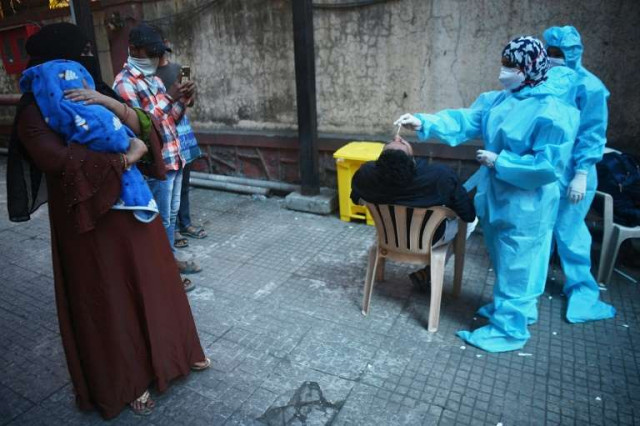Hospitals sound alarm amid surge
Health dept claims there is enough space for Covid-19 patients in Karachi

As the curve for coronavirus turns upwards once again and with Sindh reporting over 1,300 cases on Monday, hospital administrations in the provincial capital are increasingly worried about the virus resurgence, expressing concern that they may soon run out of space.
The provincial health department, though, claims hospitals in Karachi have sufficient capacity at the moment, with its data showing approximately half the Covid-19 intensive care unit (ICU) beds in the metropolis to be unoccupied.
The health department's data for Monday, a copy of which is available with The Express Tribune, states that 228 of the total 434 ICU beds in hospitals across Karachi were vacant on the day, along with 1,007 of the 1,330 high-dependency unit beds and 3,984 of the 4,067 isolation ward beds in the city.
But there are some discrepancies between this data and that provided by the hospitals themselves.
According to the management of Dr Ruth Pfau Civil Hospital, all 16 beds in its coronavirus ICU ward are fully occupied. The same is the case for the Covid-19 ICU wards at Ziauddin Hospital's Clifton and North Nazimabad campus.
The Dr Ruth Pfau Civil Hospital administration informed The Express Tribune that there are a total of 141 beds for virus patients in the ICU and high-dependency unit (HDU), along with eight ventilators. They added that 88 beds and all but one ventilator were occupied. Health department data, though, shows 14 vacant ICU beds with ventilators.
At Jinnah Postgraduate Medical Centre, sources told The Express Tribune, there are 90 beds for Covid-19 patients, with 24 in the HDU and 12 with ventilators. According to the data provided by the health department, all ICU beds there were occupied as of Monday, while 19 HDU beds were vacant.
Lyari General Hospital said it had 60 ICU and HDU beds, with 10 ventilators, with the health department saying it has six available ICU beds.
While Dow University of Health Sciences said its 30-bed ICU ward was fully occupied, the health department claimed none of its beds were occupied.
Meanwhile, the Sindh Infectious Diseases Hospital and Research Centre was near capacity on Monday, with only two empty ICU beds and none in the HDU, and 70 of 150 HDU and ICU beds were occupied at the Expo Centre field isolation facility.
Aga Khan University Hospital, too, has all its coronavirus ICU beds occupied and only four HDU beds vacant, according to the health department.
However, 30 out of 40 HDU beds at the Sindh Services Hospital, along with all ventilators, are available, while the health department's data showed that Liaquat National Hospital appeared to have 14 ICU beds and 11 HDU beds available.
Besides, the 100-bed ward meant to be set up at Abbasi Shaheed Hospital (ASH) remains non-functional, despite being inaugurated by Federal Planning and Development Minister Asad Umar in July.
JPMC executive director Dr Seemin Jamali told The Express Tribune that with the second wave of the pandemic, which was deemed more dangerous, the number of patients at hospitals was increasing. "But JPMC is still admitting coronavirus patients, and people from different hospitals are being referred here," she claimed.
Health department spokesperson Meeran Yousuf, meanwhile, said that the provincial government had enhanced the capacity of hospitals in this regard very recently. "Our hospitals have enough space, but the number of patients is going up with every passing day," she added. "Most of them need HDU beds, not ventilators, and we have enough HDU beds right now."
But, she added, if the number of patients continued to rise in the coming weeks, the situation would turn critical for hospitals.
According to her, the second portion of the Sindh Infectious Diseases Hospital and Research Centre had also been made functional. "But people prefer going to private hospitals and don't trust our facilities."
Dr Naseem Salahuddin, an infectious diseases expert at the Indus Hospital, also expressed worry about the increasing burden on hospitals, calling for the arrangement of more beds and ventilators. "If the circumstances remain the same, the situation will spiral out of control," she warned, adding that a large number of health officials and medical workers had also been infected.
Ban on indoor dining
Separately, in view of the virus surge, Karachi commissioner and administrator Iftikhar Shallwani imposed a ban on indoor dining at restaurants in the metropolis, to be in effect from Tuesday.
He directed the city's deputy commissioners to ensure that restaurants only permitted dining in open spaces.
Published in The Express Tribune, November 24th, 2020.



















COMMENTS
Comments are moderated and generally will be posted if they are on-topic and not abusive.
For more information, please see our Comments FAQ